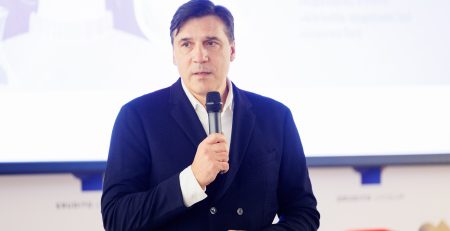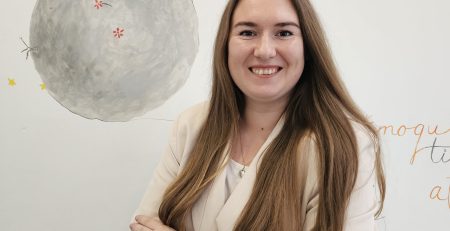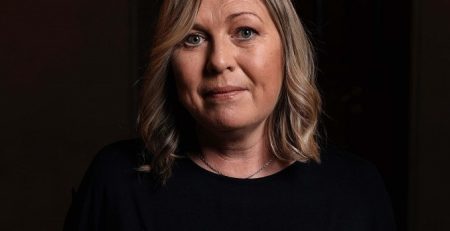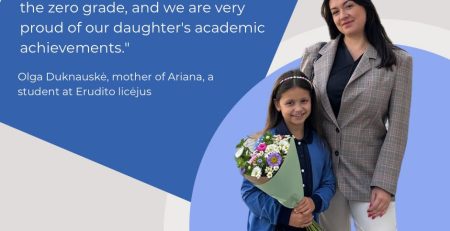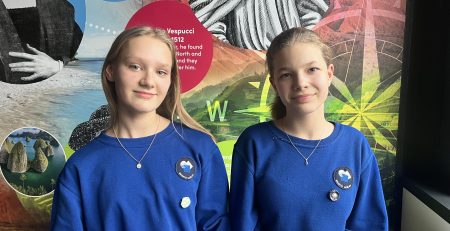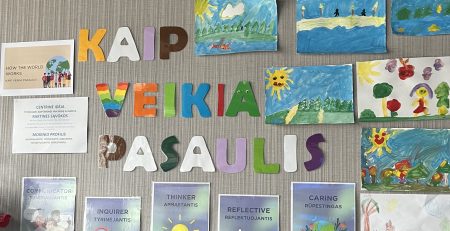“We have not only two daughters, but also a school – that is our family,” say the founders of Erudito Licėjus, Nerijus and Laima Pačėsos, to ‘ELLE Kids Lithuania’. “We devote all our love and heart to the school, we never spared ourselves or our time,” they say.
How did the idea of starting your own school originate, considering that it is a family creation? Who was the initiator among you?
Nerijus: It would be difficult to pinpoint whose initiative this idea came from.
Laima: When Nerijus was the rector of ISM, he often said that Kaunas needed a private school. That idea was also echoed at home. We returned to those thoughts after fifteen years when our little one was born. At first, we sent her to the private school “Anima,” where free personalities were nurtured, the teacher was like a friend, and there was a strong sense of community. When it closed, we thought that a similar school was sorely lacking.
Nerijus: We thought on a broader scale – what kind of modern schools are needed. These thoughts naturally arose while working at the university, seeing what freshmen come to study, what might be lacking. For people who have completed higher education, it is usually not knowledge that is lacking, but general competencies, which are extremely important. These include the ability to make decisions based on the situation and take necessary actions, as well as a lack of self-reliance. These seem like elementary things, but they are not easily acquired; they take time. It’s best if they are cultivated from the school bench. ISM University closely collaborates with business, and we heard the same from representatives of this sector. Naturally, ideas arose about what we could do differently.
Laima, you are an important part of the community; did you immediately know what role you would like to have in creating the school? Did you consider staying on the sidelines?
There wasn’t even a thought that I could step back because we do everything together; we support each other very much. Moreover, we do everything quickly; we don’t like long preparations. So we clarified responsibilities and just moved forward. And quickly – we don’t hesitate when we decide to act.
How much time has passed since the idea and the opening of the school? What was that time like?
Nerijus: From the moment we said we were taking action until the first meeting with parents and the presentation of the school, only a month passed. We acted very quickly. I remember the first presentation took place in a building that wasn’t even finished being renovated yet. I took care of the presentation, and Laima took care of everything else – how to welcome parents, what to do for the children who came, and so on. Everything happened very organically.
What would you identify as the biggest challenges? Did it match your dream of what kind of school you wanted, or did everything unfold according to your vision?
Nerijus: There are always challenges; those who do nothing don’t have them. Most often, challenges come from three places: the team and the collective. We have a vision that a team of one hundred fifty people should follow, but working with a team is constant and never-ending. In English, these challenges are called wicked challenges, i.e., unsolvable challenges. The second part of the challenges comes (especially during the creation process) from what is beyond our control. For example, the landlord of the premises may decide to give the building to another tenant. But that’s beyond our control. In a sense, this is the price of rapid growth. And the third group of challenges is from the students and parents. Every day there are situations where students face challenges, and parents also have various expectations. All of this needs to be resolved quickly. It’s hard to find areas where there are so many challenges practically every day.
Laima: We are very involved in the life of the school ourselves; we devote all our love and heart to it. It’s like our family: we have not only two daughters but also Erudito Licėjus.
Working together, do you consider it an advantage or also a challenge? How do you deal with it?
Nerijus: I consider it only an advantage! Our common experience is long, we understand each other well, so working together is not difficult for us; we complement each other well: I need new projects, challenges, I tend to generalize, pay less attention to details, and Laima notices and asks critical questions, sometimes, if necessary, she can even stop, thus, balance is created. Another person can say what employees might not dare to say. Sometimes people find it difficult to maintain professional and personal relationships, especially if there is a hierarchical relationship, we have no problems with that. We have learned that at work, we are colleagues.
Laima: You won’t believe it, but we rarely see each other at work! Sometimes people ask me what the director will do at that time, but I sincerely don’t know! Only our administrator Aistė knows the director’s schedule (laughs).
So, at home, there’s no agreement not to talk about work?
Laima: There’s no such rule. Everything happens organically: if necessary, we talk, consult.
Nerijus: Probably we learned to live with the idea that there are no taboo topics, no inappropriate time if something needs to be discussed. Sometimes you rest, and a thought comes – it’s good that there is someone to share it with.
How did the concept of the school itself come about? How much did your opinions coincide?
Nerijus: I think our opinions coincided and have been coinciding for a long time. It wasn’t that we took a blank piece of paper and started writing what a modern school should be like. As we mentioned earlier, our daughter attended the “Anima” school; its creators brought the idea of what a school based on Western ideas should look like, we liked it because they understood the meaning of education, they had outpaced the times. It became a kind of reference point for us – what kind of school we would like – nurturing free, creative, responsible personalities. Sometimes parents worry and ask how we will implement the state education program. I can reassure and calm them: that program is wonderful, perfectly written, it is oriented precisely towards personality development, and we sincerely adhere to it and follow it.
Laima: I remember how we used to sit at such a round table and talk every day about what kind of school we want. Some teachers who have been working at the school since its inception, that is, for eight years, say they remember that round table and how we used to talk around it. With our presence, for example, we aimed to create a feeling that we speak the same language, that we understand each other.
Laima, what knowledge and skills have helped and continue to nurture the community of the lyceum? What common traditions do you have at the school?
Creating a sense of community and unity in the school is very important to me so that everyone feels like part of a big family. After all, we are one big family! We have family members from all over the world – more than twenty countries – so paying attention to each individual, ensuring they feel good here, requires constant attention and a positive attitude. I want everyone to care for each other, to feel like we are a team, and then the teachers carry this feeling into their lessons. One person can’t do it alone. We all work for one goal – the children. And children are constantly changing, so there are constantly various challenges. We try to experience everything together, to hear what the teachers, parents, and children say. Various rituals and traditions help strengthen the community – informal gatherings outside the school environment, various trips and travels, common celebrations. The school is already big, but sometimes I really want a big round table where everyone can fit.
Nerijus: We try to create that sense of family and community during holidays. When we celebrate Christmas Eve, we bring our family’s traditional dishes to one table, so we feel like a family and get to know each other better. We believe that the group is greatly strengthened at the end of summer, before each September, during intensive two-week sessions spent together. The Erudito Lyceum teachers’ improvement academy sessions, which take place several times a year, usually during students’ vacations, are also an opportunity to be together, strengthen the community, and learn something new, blending formal and informal relationships through which we, as a team, train.
Laima: In April, Erudito lyceum celebrates its birthday. This also becomes a beautiful community celebration, during which we honor the teachers, organize annual awards that have become a tradition, and employees nominate their colleagues in categories like most proactive, professional, friendly, positive, civic-minded, environmentally conscious. But we try to be together, communicate, notice each other, and show daily attention. I believe in the power of close relationships and strive to create one like in a family.
If we’re talking about teachers, it’s not easy to attract good specialists today. How are you managing to do that? What kind of teachers work here, and what do you pay attention to besides education when selecting them?
Nerijus: One of the primary criteria should be the teacher’s experience. It’s important to us that the teacher understands the educational process, the results, but we’re looking for people who want to work differently, understand the meaning of education, and want education based on different values and principles. This is not a small challenge because anyone who thinks they want to work differently can work that way. Experience shows that in our formats, when we need to work with young personalities with liberal, democratic principles, to organize education actively, involve the student, respect their personality, but also to form respect in them, wisdom and experience in organizing education are needed. An inclusive environment needs to be constantly managed, stimulated, motivated – this requires huge resources and efforts. It requires experience. But I think the desire is probably the most important thing here. If a person wants it and believes in what they do, they can do anything.
Laima: We also have to constantly learn and improve ourselves, not stand still.
Your family duo was joined a few years ago by your daughter Ieva, who is currently on maternity leave. How did she get involved in the life of the lyceum?
Laima: Ieva has always been very curious, studious, she started going to school at the age of five. And she grew up like that. Ieva saw how we work, participated in our celebrations, and after graduating from ISM, after working in international companies, she asked if she could contribute in some way. We didn’t seek to involve her in the family business, we wanted both daughters to consciously choose their own path.
Nerijus: After graduation, Ieva stayed to live in Vilnius, and we were just opening a branch there. The idea to try working together naturally and organically arose. It really didn’t take any effort to try to involve her; she naturally integrated into the life of the school.
What are the fundamental values that Erudito Licėjus is built on?
Nerijus: We established those values a long time ago, and they have not changed – it is very important for us to nurture independent thinking, to raise a free and independent personality who must form their own attitudes and be able to justify them. Alongside that, there’s friendliness, respect for others, respect for others’ opinions. Freedom goes hand in hand with responsibility, which is also important. Sometimes people who take on leadership face opposition. When we understand that we will not develop free personalities with prohibitions and punishments but with examples and involvement, then we will start to change as a society.
Laima: This requires infinite patience and time, but the results are different, so it’s definitely worth the wait (smiles). When faced with any challenge, we don’t punish the children; instead, we teach them to do good deeds: inappropriate behavior is replaced with good deeds. Punishment is the easiest way, but for this generation, which wants to try everything, experience everything, it doesn’t work; we have to find other ways. We try to cultivate thinking, we talk a lot with the students. We take the harder path, but we see great meaning in it.
How would you describe the current stage of the lyceum?
Nerijus: We’ve already gone through a stage of rapid growth and change; I think we are gradually approaching a stage of maturity: we have stabilized the number of students in Kaunas, and it is also gradually stabilizing in Vilnius. This allows us to pay more attention to details.
Laima: Since we have been together for thirty years, I understand that we won’t live quietly (smiles). We have always lived intensively, and we will come up with something new again. At first, we thought we would work intensively for about five years, and then it would be quieter, but Erudito Licėjus is already counting its eighth year… (Laughs)
Work is work, but what leisure activities do you both and your daughters enjoy? What do you like to do to relax?
Laima: We love to travel together. We have our own countries, destinations, we each express our desires, and we try to fulfill them. We really enjoy cycling, rollerblading, and scootering together. We never close the cycling season in general.
Nerijus: We especially travel a lot by car. It allows us to experience the journey in a completely different way, creates a completely different dynamic within the family. We spend many kilometers together in a small space, we communicate a lot, which creates very good relationship perspectives. And now, we see that our older daughter is following our example – recently, the whole family went on a trip together.
Laima: We enjoy traveling by car because we have various activities: we listen to each other’s music (that’s how we find out each other’s favorite bands), watch movies, I read a magazine aloud to everyone, Liepa writes her notes. Traveling helps us get to know each other even better. Togetherness is our greatest value. All the things we do together make up our whole life.
Akvilė Razauskienė photography (“ELLE Kids Lithuania”)




